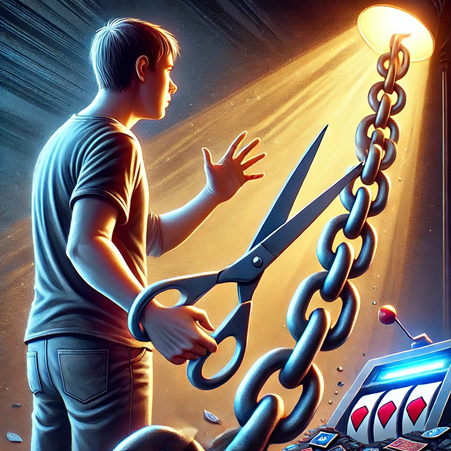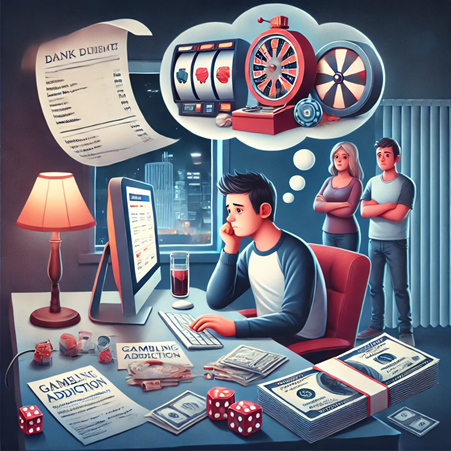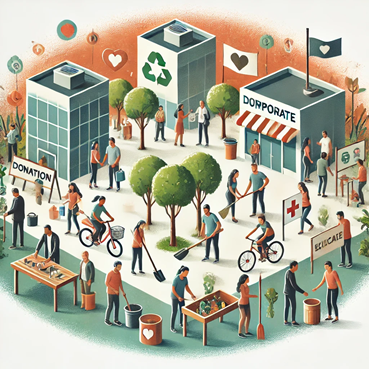Recognizing the Signs of Gambling Addiction

Recognizing the Signs of Gambling Addiction
by Nathaniel 03:49pm Jan 13, 2025

Recognizing the Signs of Gambling Addiction
Gambling can be an exciting and enjoyable activity for many, but for some, it can become an uncontrollable habit that leads to serious consequences. Gambling addiction, or compulsive gambling, is a psychological condition where a person becomes unable to stop gambling despite the negative impacts on their life, relationships, and finances. It's important to recognize the signs of gambling addiction early to prevent further harm and seek help. Here’s a closer look at the key signs and symptoms of gambling addiction.
1. Increasing Time and Money Spent on Gambling
Time Commitment:One of the most obvious signs of gambling addiction is the amount of time a person spends gambling. If someone regularly spends more time gambling than planned, and it starts to interfere with their daily life (such as work, school, or family responsibilities), it may be a red flag.
Financial Strain:Gambling addicts often spend more money than they can afford, sometimes even borrowing or stealing money to continue gambling. If you or someone you know is spending a disproportionate amount of money, despite the financial consequences, this is a clear indicator of addiction.
Chasing Losses: A person with a gambling problem may continue gambling in an attempt to recover their losses, which can lead to even greater financial problems.This is known as chasing losses.
2. Neglecting Responsibilities
Work and Family Life:Gambling addiction often leads to the neglect of important responsibilities. A person may start to miss work, avoid social engagements,or neglect family commitments to pursue gambling. Over time, this neglect can harm relationships and impact their career or studies.
Decreased Productivity: The individual might become less focused on tasks or experience a decline in their performance at work or school due to being preoccupied with gambling.
3. Emotional and Psychological Signs
Preoccupation with Gambling: A person struggling with gambling addiction will often talk about gambling or think about it constantly. They may daydream about future gambling sessions, reliving past wins and losses, or plan their next betting event.
Irritability and Anxiety: As gambling becomes more problematic, a person might become irritable, anxious, or depressed when not gambling or when they are unable to gamble. This mood swing can be an indicator that gambling is no longer just a hobby but a compulsion.
Feelings of Guilt or Shame: Many people with gambling addictions feel intense shame, guilt, or remorse for their behavior, especially when they lose large sums of money or hurt loved ones. These feelings often lead them to hide their gambling habits, which can exacerbate the problem.
4. Risky or Illegal Behavior
Lying and Deception: To hide the extent of their gambling problem, an individual may lie about the amount of time and money they are spending. They may also make up excuses or manipulate loved ones to conceal their actions.
Borrowing or Stealing Money: A gambling addict may resort to borrowing money from friends, family, or even strangers, and in more severe cases, might resort to stealing or engaging in other illegal activities to fund their gambling habit.
5. Inability to Stop or Cut Back
Failed Attempts to Quit: A clear sign of gambling addiction is the inability to stop or reduce the amount of time spent gambling, despite repeated efforts. Even if the person recognizes the negative impact of their gambling behavior, they may struggle to stop, as gambling becomes a compulsion they cannot control.
Tolerance:Similar to substance abuse, gambling addicts may need to bet larger amounts of money or engage in gambling activities more frequently to achieve the same level of excitement or satisfaction.
6. Deteriorating Relationships
Conflict with Loved Ones: Gambling addiction can lead to significant strain on relationships. Family members, partners, and friends may become frustrated, disappointed, or even angry as the addicted person prioritizes gambling over relationships. This can result in emotional distance, arguments, and even the breakdown of the relationship.
Isolation:A person with a gambling addiction may begin to withdraw from social situations, preferring to gamble alone. They may lose interest in activities that used to bring them joy and instead focus on finding ways to gamble.
7. Risk of Mental Health Issues
Depression and Anxiety: Chronic gambling addiction can often lead to depression, anxiety, or other mental health disorders. The overwhelming stress of financial problems, relationship breakdowns, and the cycle of winning and losing can take a significant toll on mental well-being.
Suicidal Thoughts:In extreme cases, the stress of gambling addiction can lead to suicidal ideation, especially if the individual feels they have no way out. If someone is expressing thoughts of self-harm or suicide, it’s crucial to seek immediate professional help.
8. Obsessive or Impulsive Gambling Behavior
Gambling as a Form of Escape: Some individuals gamble to escape from stress,depression, or emotional pain. This can lead to compulsive gambling behavior, where the individual uses gambling as a way to cope with life’s challenges rather than seeking healthier alternatives.
Gambling Despite Negative Consequences: Even after experiencing significant negative outcomes(e.g., financial ruin, broken relationships, loss of employment), the individual may continue to gamble, demonstrating a lack of control over their actions.
What to Do If You Recognize the Signs of Gambling Addiction
If you or someone you know is exhibiting signs of gambling addiction, it’s important to take action:
Seek Help:Gambling addiction is a serious condition that requires professional help. There are many resources available, including therapy, counseling, and support groups such as Gamblers Anonymous.
Consider Therapy:Cognitive-behavioral therapy (CBT) has been proven effective in treating gambling addiction. Therapy can help individuals understand the root causes of their addiction and develop healthier coping mechanisms.
Create a Support System: Reach out to loved ones or join a support group to share experiences and gain strength from others who are going through similar struggles.
Self-Exclusion Programs: Many casinos and online gambling platforms offer self-exclusion programs, where individuals can voluntarily ban themselves from gambling venues for a set period. This can be a good first step in controlling the behavior.
Financial Counseling:If gambling has led to severe financial problems, it may be helpful to consult with a financial advisor or credit counselor to help manage debts and create a recovery plan.
Conclusion
Recognizing the signs of gambling addiction is the first step toward seeking help and recovery. Gambling addiction doesn’t just affect the person struggling with it—it can also have a profound impact on their loved ones and those around them. If you notice these signs in yourself or others, it’s essential to reach out for help as soon as possible. With the right support, therapy, and resources, it’s possible to regain control and rebuild a healthy and balanced life.






